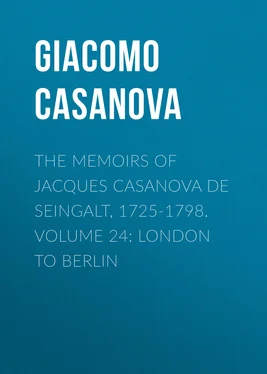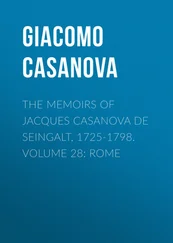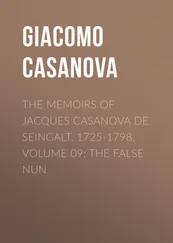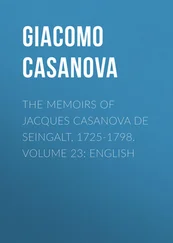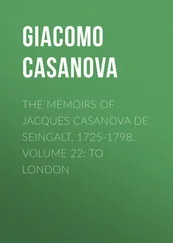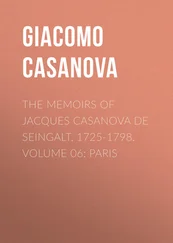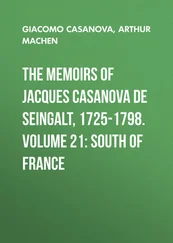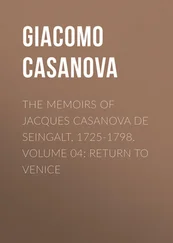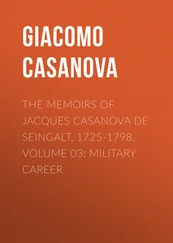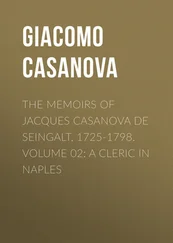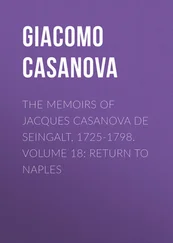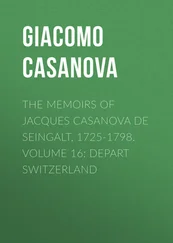Giacomo Casanova - The Memoirs of Jacques Casanova de Seingalt, 1725-1798. Volume 24 - London to Berlin
Здесь есть возможность читать онлайн «Giacomo Casanova - The Memoirs of Jacques Casanova de Seingalt, 1725-1798. Volume 24 - London to Berlin» — ознакомительный отрывок электронной книги совершенно бесплатно, а после прочтения отрывка купить полную версию. В некоторых случаях можно слушать аудио, скачать через торрент в формате fb2 и присутствует краткое содержание. Жанр: Биографии и Мемуары, История, foreign_edu, foreign_antique, foreign_prose, на английском языке. Описание произведения, (предисловие) а так же отзывы посетителей доступны на портале библиотеки ЛибКат.
- Название:The Memoirs of Jacques Casanova de Seingalt, 1725-1798. Volume 24: London to Berlin
- Автор:
- Жанр:
- Год:неизвестен
- ISBN:нет данных
- Рейтинг книги:3 / 5. Голосов: 1
-
Избранное:Добавить в избранное
- Отзывы:
-
Ваша оценка:
- 60
- 1
- 2
- 3
- 4
- 5
The Memoirs of Jacques Casanova de Seingalt, 1725-1798. Volume 24: London to Berlin: краткое содержание, описание и аннотация
Предлагаем к чтению аннотацию, описание, краткое содержание или предисловие (зависит от того, что написал сам автор книги «The Memoirs of Jacques Casanova de Seingalt, 1725-1798. Volume 24: London to Berlin»). Если вы не нашли необходимую информацию о книге — напишите в комментариях, мы постараемся отыскать её.
The Memoirs of Jacques Casanova de Seingalt, 1725-1798. Volume 24: London to Berlin — читать онлайн ознакомительный отрывок
Ниже представлен текст книги, разбитый по страницам. Система сохранения места последней прочитанной страницы, позволяет с удобством читать онлайн бесплатно книгу «The Memoirs of Jacques Casanova de Seingalt, 1725-1798. Volume 24: London to Berlin», без необходимости каждый раз заново искать на чём Вы остановились. Поставьте закладку, и сможете в любой момент перейти на страницу, на которой закончили чтение.
Интервал:
Закладка:
Giacomo Casanova
The Memoirs of Jacques Casanova de Seingalt, 1725-1798. Volume 24: London to Berlin
CHAPTER XIV
Bottarelli—A Letter from Pauline—The Avenging Parrot—Pocchini—Guerra, the Venetian—I Meet Sara Again; My Idea of Marrying Her and Settling in Switzerland—The Hanoverians
Thus ended the first act of the comedy; the second began the next morning. I was just getting up, when I heard a noise at the street door, and on putting my head out of the window I saw Pocchini, the scoundrel who had robbed me at Stuttgart trying to get into my house. I cried out wrathfully that I would have nothing to do with him, and slammed down my window.
A little later Goudar put in an appearance. He had got a copy of the St. James's Chronicle, containing a brief report of my arrest, and of my being set a liberty under a bail of eighty guineas. My name and the lady's were disguised, but Rostaing and Bottarelli were set down plainly, and the editor praised their conduct. I felt as if I should like to know Bottarelli, and begged Goudar to take me to him, and Martinelli, happening to call just then, said he would come with us.
We entered a wretched room on the third floor of a wretched house, and there we beheld a picture of the greatest misery. A woman and five children clothed in rags formed the foreground, and in the background was Bottarelli, in an old dressing-gown, writing at a table worthy of Philemon and Baucis. He rose as we came in, and the sight of him moved me to compassion. I said,—
"Do you know me, sir?"
"No, sir, I do not."
"I am Casanova, against whom you bore false witness; whom you tried to cast into Newgate."
"I am very sorry, but look around you and say what choice have I? I have no bread to give my children. I will do as much in your favour another time for nothing."
"Are you not afraid of the gallows?"
"No, for perjury is not punished with death; besides it is very difficult to prove."
"I have heard you are a poet."
"Yes. I have lengthened the Didone and abridged the Demetrio."
"You are a great poet, indeed!"
I felt more contempt than hatred for the rascal, and gave his wife a guinea, for which she presented me with a wretched pamphlet by her husband: "The Secrets of the Freemasons Displayed." Bottarelli had been a monk in his native city, Pisa, and had fled to England with his wife, who had been a nun.
About this time M. de Saa surprised me by giving me a letter from my fair Portuguese, which confirmed the sad fate of poor Clairmont. Pauline said she was married to Count Al–. I was astonished to hear M. de Saa observe that he had known all about Pauline from the moment she arrived in London. That is the hobby of all diplomatists; they like people to believe that they are omniscient. However, M. de Saa was a man of worth and talent, and one could excuse this weakness as an incident inseparable from his profession; while most diplomatists only make themselves ridiculous by their assumption of universal knowledge.
M. de Saa had been almost as badly treated by the Charpillon as myself, and we might have condoled with one another, but the subject was not mentioned.
A few days afterwards, as I was walking idly about, I passed a place called the Parrot Market. As I was amusing myself by looking at these curious birds, I saw a fine young one in a cage, and asked what language it spoke. They told me that it was quite young and did not speak at all yet, so I bought it for ten guineas. I thought I would teach the bird a pretty speech, so I had the cage hung by my bed, and repeated dozens of times every day the following sentence: "The Charpillon is a bigger wh—e than her mother."
The only end I had in view was my private amusement, and in a fortnight the bird had learnt the phrase with the utmost exactness; and every time it uttered the words it accompanied them with a shriek of laughter which I had not taught it, but which made me laugh myself.
One day Gondar heard the bird, and told me that if I sent it to the Exchange I should certainly get fifty guineas for it. I welcomed the idea, and resolved to make the parrot the instrument of my vengeance against the woman who had treated me so badly. I secured myself from fear of the law, which is severe in such cases, by entrusting the bird to my negro, to whom such merchandise was very suitable.
For the first two or three days my parrot did not attract much attention, its observations being in French; but as soon as those who knew the subject of them had heard it, its audience increased and bids were made. Fifty guineas seemed rather too much, and my negro wanted me to lower the price, but I would not agree, having fallen in love with this odd revenge.
In the course of a week Goudar came to inform me of the effect the parrot's criticism had produced in the Charpillon family. As the vendor was my negro, there could be no doubt as to whom it belonged, and who had been its master of languages. Goudar said that the Charpillon thought my vengeance very ingenious, but that the mother and aunts were furious. They had consulted several counsel, who agreed in saying that a parrot could not be indicted for libel, but that they could make me pay dearly for my jest if they could prove that I had been the bird's instructor. Goudar warned me to be careful of owning to the fact, as two witnesses would suffice to undo me.
The facility with which false witnesses may be produced in London is something dreadful. I have myself seen the word evidence written in large characters in a window; this is as much as to say that false witnesses may be procured within.
The St. James's Chronicle contained an article on my parrot, in which the writer remarked that the ladies whom the bird insulted must be very poor and friendless, or they would have bought it at once, and have thus prevented the thing from becoming the talk of the town. He added,—
"The teacher of the parrot has no doubt made the bird an instrument of his vengeance, and has displayed his wit in doing so; he ought to be an Englishman."
I met my good friend Edgar, and asked him why he had not bought the little slanderer.
"Because it delights all who know anything about the object of the slander," said he.
At last Jarbe found a purchaser for fifty guineas, and I heard afterwards that Lord Grosvenor had bought it to please the Charpillon, with whom he occasionally diverted himself.
Thus my relations with that girl came to an end. I have seen her since with the greatest indifference, and without any renewal of the old pain.
One day, as I was going into St. James's Park, I saw two girls drinking milk in a room on the ground floor of a house. They called out to me, but not knowing them I passed on my way. However, a young officer of my acquaintance came after me and said they were Italians, and being curious to see them I retracted my steps.
When I entered the room I was accosted by the scoundrelly Pocchini, dressed in a military uniform, who said he had the honour of introducing me to his daughters.
"Indeed," said I, "I remember two other daughters of yours robbing me of a snuff-box and two watches at Stuttgart."
"You lie!" said the impudent rascal.
I gave him no verbal answer, but took up a glass of milk and flung it in his face, and then left the room without more ado.
I was without my sword. The young officer who had brought me into the place followed me and told me I must not go without giving his friend some satisfaction.
"Tell him to come out, and do you escort him to the Green Park, and I shall have the pleasure of giving him a caning in your presence, unless you would like to fight for him; if so, you must let me go home and get my sword. But do you know this man whom you call your friend?"
Читать дальшеИнтервал:
Закладка:
Похожие книги на «The Memoirs of Jacques Casanova de Seingalt, 1725-1798. Volume 24: London to Berlin»
Представляем Вашему вниманию похожие книги на «The Memoirs of Jacques Casanova de Seingalt, 1725-1798. Volume 24: London to Berlin» списком для выбора. Мы отобрали схожую по названию и смыслу литературу в надежде предоставить читателям больше вариантов отыскать новые, интересные, ещё непрочитанные произведения.
Обсуждение, отзывы о книге «The Memoirs of Jacques Casanova de Seingalt, 1725-1798. Volume 24: London to Berlin» и просто собственные мнения читателей. Оставьте ваши комментарии, напишите, что Вы думаете о произведении, его смысле или главных героях. Укажите что конкретно понравилось, а что нет, и почему Вы так считаете.
